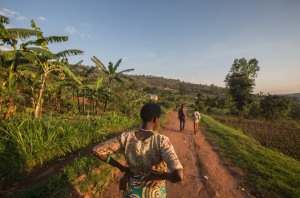In a moment of serendipity, I published an article this week at the Christian Science Monitor at exactly the same time its topic, poverty tourism, became a hot debate on Bill Easterly’s blog and at Huffington Post.
The controversy started when Magatte Wade, a Senegalese entrepreneur, penned a long piece objecting to a tour that’s run in the Millennium Village in Rwanda and to Jeffrey Sachs in general (Sachs being the intellectual father of the MV projects and many other millennial and non-millennial things). Wade’s objection is that the tour brochure says, “Please do not give anything to the villagers — no sweets, cookies, empty water bottles, pens or even money.” She says the sign “objectif[ies] us”:
Rule #1 goes on to explain the rationale for the rule, “Our desire is to encourage a culture of entrepreneurship and service provision rather than handouts.” Again, I’m completely sympathetic to the encouragement of entrepreneurship, but the situation is entirely ludicrous — American professors spending tens of millions of dollars telling villagers how they should live their lives, so that American tourists can go and watch the new feature at the zoo in which the African natives are doing just as they are told by the American experts — with the careful warning to the tourists not to contaminate the zoo display by feeding the animals. This is how Sachs supports African entrepreneurship?
It’s certainly not a pretty image, but Wade gets the analysis wrong. American professors aren’t spending millions “so that” tourists can go stare at the people they spend millions on. The Millennium Villages weren’t conceived as tourist attractions, and no one treats Mayange like Disney World. (Donald Ndahiro makes this and other interesting points in his response. Gold star for “new media” as “participatory media”!)
Wade goes on to object to Sachs-style development, and that’s a long debate (with installments earlier this spring on HuffPo) that I don’t want to get into. Instead, I want to highlight what Bill Easterly said, picking up on Wade’s post. (It should be noted that Jeff Sachs and Bill Easterly have two very different and competing philosophies on aid and how to do it.)
Easterly agrees with the objectification critique. He blogged:
“Try looking at the poor Rwandans living in the MV not as anonymous and interchangeable exhibits for a “poverty trap,” but as individuals who possess rights and human dignity just like us. Then we maybe we will understand that the most impressive, knowledgeable, and motivated soldiers in the war on poverty are usually poor individuals themselves.”
When I called the tour operators in January to set up an interview, I had similar critiques in mind. $90 to stare at poor people? Africans as exhibits? All with the stamp of approval of the intellectual heirs of Jeffrey Sachs? Oh, this is good…
But I learned in my reporting the same thing I learn over and over again from the conversations on this and other blogs: If it’s that easy to be flip, you’re probably missing something.
(It’s worth noting that of all the voices weighing in on this, only the tour operators, Ndahiro and Josh Ruxin, who founded the Millennium Village in Rwanda, have any actual experience with the village tour. And I guess it’s not too promotional to point out that, so far, I seem to be the only person in the debate who knows the tour from experience but doesn’t have a professional tie to it.)
On the ground, it was a lot more complicated, as it always is. I took the tour and talked with tourists; I went back to the village to interview the people whose homes and places of work were stops on the tour. I put the Wade/Easterly critique to the villagers, but it didn’t resonate. They didn’t admit to feeling exploited; they said they liked exchanging ideas. And when I was on the tour, that’s what a lot of it was–not passive exhibitionism, but active engagement and interesting conversation. You can read more about this in my story.
Here’s the bigger point of the blog post: If you remove money from the equation, would you still feel uncomfortable? If you didn’t pay to take a tour of Mayange, but instead drove out there yourself, brought a translator, and bumbled from homestead to homestead asking the same questions, would you be described as an exploitative voyeur? Chances are you’d more likely be considered an adventurous traveler. You might even be labelled an “ethical” traveler, for choosing to go to such lengths to engage with the local culture.
One more alternative exercise: Think about paying money to go look at rich people and how they live. Do you feel uneasy about touring Windsor Castle? No. So why do we feel bad if the people are poor instead of rich? You might say there’s a greater power differential, and you’d be right. But that differential doesn’t magically disappear if you visit poor people for free. They’re still poor. You’re still (relatively) not. And unless you stop traveling to these places–which I don’t think anyone would advocate as beneficial for the poor–that’s not going to change.
Here’s what I’m getting at: I think the uneasiness that leads to the Wade/Easterly critique–and to my own critiques–is a very useful intuition that can help keep a check on exploitation. But ultimately, I think the critique that poverty tourism exploits the poor has very little to do with the poor. I think that it has much more to do with the discomfort we feel about our own economic power and our concerns about using it ethically. There’s got to be a better way to deal with that than riffing on a brochure.
There is one difficult, uncomfortable question to be asked about the tour; it’s just not the one Wade and Easterly found. I’ll visit this dilemma tomorrow.




Very insightful and interesting post, Jina! Thanks for this. Hope all is well.
I agree – a great post, especially to follow up with Bill Easterly’s and Saundra Schimmelpfennig’s blog posts. thank you for your insight! it’s nice to hear a different opinion.
Thanks for posting, Jina. I was interested to see what people who had taken the tour would say.
I disagree that the problem goes away if you visit and don’t pay. Actually, sometimes those are the worst cases of poorism I have seen.
I wrote my thoughts here: http://blogs.nyu.edu/fas/dri/aidwatch/2009/06/response_to_mv_tourism_operato.html
It actually sounds, from your comment over there, like we agree. Your comment is full of some great examples of people visiting villages, sans payment, with good intentions. I can’t imagine there are lots of people who would make the trek from Kigali to Mayange, sans tour group, just to gawk. My experience has been that anyone who bothers leaving Kigali to meet Rwandans are coming with intentions like the ones you describe, to exchange ideas with locals and learn things.
I think the real thing here is gawking, whether you pay to do it or not, is wrong. Yet another thing that’s all about the gaze…
Perhaps what’s coming out of all of these blog postings is that it is “all about the gaze”. There is a world of difference between inserting yourself into someone’s life and then gawking at them because they’re different or having a real conversation, that both parties are happy to engage in, where you hear and learn from their point of view. In the first instance you objectify them in an effort to meet your own needs, in the second instance you treat them as a human being with their own needs and values.